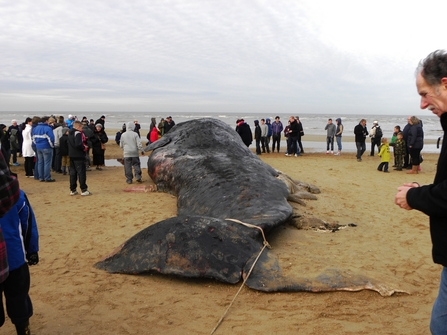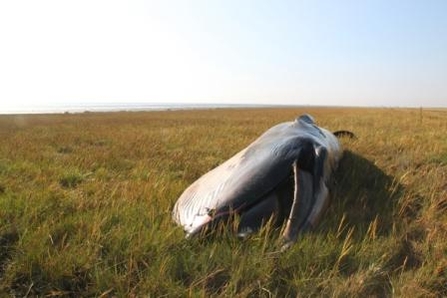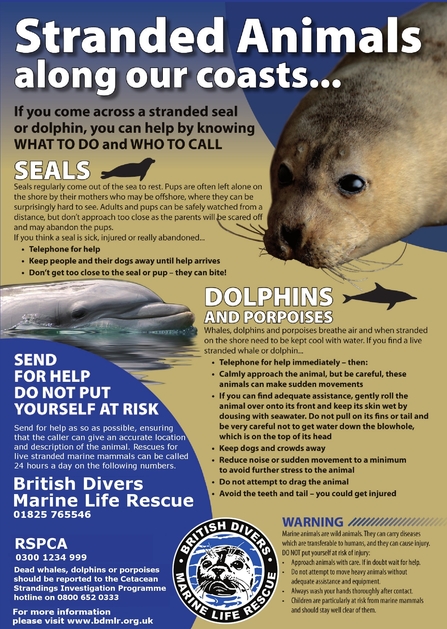Reporting sightings and strandings
Our seas are among the best in Europe for spotting whales, dolphins, porpoises and seals. Seeing one is a true privilege, and reporting it can make a huge difference to our understanding of marine wildlife, allowing us to better protect it. This page will help you know who to report a sighting or a stranding to, and what to do if you come across a beached animal.
Report a sighting
A number of groups collect UK marine sightings, and are always interested to know what you have seen. Use the links below to report your sightings of the following animals:
- Whales, dolphins and porpoises
- Basking sharks, turtles, jellyfish and alien species
- Seals: If in Cornwall and the South West, please report to The Cornwall Seal Group
Elsewhere, please report to your local Wildlife Trust with date, location, number (and ideally a picture) information for creation of sighting records.
Report a live stranding
|
England, Scotland & Wales (all species) |
Rescue hotline: 01825 765546
0800 652 0333 |
|
| Northern Ireland (cetacean or shark) |
DAERA |
028 70823600 |
| Northern Ireland (sick/injured seals) | Exploris Aquarium | 028 427 28062, if no answer, call the NI Water Pollution Hotline on 0800 807 060 |
| Isle of Man (all species) | MSPCA | 01624 851672 |
Report a dead stranding
| England, Scotland & Wales (all species) | Cetacean Strandings Investigation Programme | 0800 652 0333 |
| Scotland (all species) | Scottish Marine Animal Stranding Scheme | 07979 245893 |
| Northern Ireland (cetacean or shark) | DAERA | 028 70823600 |
| Northern Ireland (seal or otter) | DAERA | marine.wildlife@daera-ni.gov.uk |
| Isle of Man (all species) | Manx Wildlife Trust(Marine Officer) | 07624 450879 or 01624 844432 |
| Cornwall (all species) | Cornwall Wildlife Trust Marine Strandings Network | 0345 201 2626 |
If you need help identifying a species, use our Green Marine Wildlife Guide, produced in conjunction with the RYA Green Blue. The digital edition is available via the free ‘RYA Books’ app under ‘Catalogues & Brochures’.
If you find a live stranded animal
Finding a stranded animal can be distressing. Though your first instinct may be to try to help it back into the water, you should never try to do this - they have stranded for a reason and require urgent professional medical attention.

Never try to put an animal back in the sea yourself. Always contact the relevant organisation before trying to help. © Tanya Perdikou
Keep your distance, and keep other people, dogs, and gulls away. They are wild animals so contact with or proximity to humans can add additional stress to an already distressing situation, and you also put yourself at risk of injury if the animal thrashes or tries to move. Direct contact can also transmit disease.
Contact the relevant organisation as soon as possible using the details above. Note your location, the state of the tide, and any obvious injuries you can see.
Below are some guidelines for commonly reported strandings. For specific details on dealing with live strandings, visit the BDMLR website. Please do not try to deal with a stranded animal alone - always call for help.
Live seals
Are you sure the animal is in distress? Healthy adult seals regularly haul out of the water to rest and seal pups (a seal with a white, long-haired coat in the autumn/winter, or less than 3 feet in length in the summer) are often left alone for short periods of time. The best thing to do is keep watch from a distance.
If the animal is obviously ill, malnourished (visible ribs) or appears to be an abandoned pup, then contact your local strandings team as above for advice and assistance. Once you have called for help, keep a watch from a safe distance and try to keep other people and dogs away. Don't get too close - seals can give a nasty bite!
Live porpoises, dolphins, whales and sharks
Call for help immediately (contacts above) and your local strandings contact will advise you on what to do next. Never drag the animal or try to return it to sea, and keep dogs and crowds away as best you can and try to limit the stress to the animal, keeping noise and sudden movements to a minimum. Stay away from the tail - it is very powerful.
Live turtles
Call for help immediately (as above). Live turtle strandings are more likely in winter months, when juvenile turtles are swept into our waters by ocean storms. Sea turtles normally live in tropical waters and don't cope well with cold water (anything below 10°C). Their body will stop working properly, leaving them unable to swim, and they end up washing ashore - often badly injured and requiring immediate medical attention. Never try to return the turtle to sea and stay away from their front flippers - they are very powerful.
Specific details on dealing with live strandings can be found on the BDMLR website. Please do not try to deal with a stranded animal alone - always call for help.
If you find a dead stranded animal
Please report your find. Information collected from dead stranded animals is vital to our understanding of marine life and helps us work to improve marine wildlife protections.

© Kirsten Smith
Dead strandings can help us learn about marine animals' diet, health and disease, the effects of pollution and bycatch, distribution, and specific threats that they face. Avoid touching the animal and always make sure to wash your hands if any contact is made; dead marine animals, like any other animal, can carry disease or infection.
In Cornwall
The Cornwall Wildlife Trust is the licenced recorder for all marine strandings in Cornwall, with a team of over 100 volunteers who record all reported strandings on the Cornish coastline. The work of this brilliant team and the Strandings Coordinator has led to over 5500 records to date - from whales, dolphins and porpoises to basking sharks, turtles, zulu fish and buoy barnacles! Learn more about the network here.

In England or Wales
Check out this helpful poster explaining what to do in the event of a seal, porpoise or dolphin stranding.
The poster was created by Jordan Havell, leader of Jordan's Stranded Mammals Campaign. After finding a stranded porpoise on his local beach and not knowing what to do, Jordan started his campaign to raise awareness of strandings.
The poster can be downloaded here - please share!

